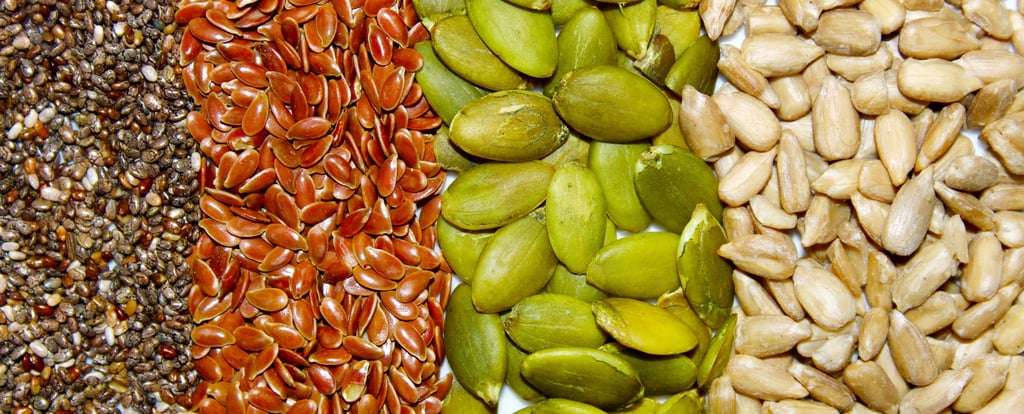A Beginner's Guide to Seeds: How Much to Eat and How to Use Them
WELLNESS


Have you ever heard people talk about "superfoods" and wondered how to get in on the action? It turns out that some of the strongest foods are right in front of you! We're talking about seeds. These little powerhouses are full of nutrients and can have a big impact on your health, from making your gut work better to making you feel better. We made the science easier to understand so you can see how a few seeds can help you get healthier.
1. Flax Seeds
(Best for Heart Health)
Recommended Daily Dose: 1 to 2 tablespoons (7 to 15 grams) of ground flaxseeds
Research Support:
A meta-analysis found that eating 30 grams of flaxseed a day lowered total and LDL cholesterol levels significantly. Ground flax is easier for the body to absorb than whole seeds.
How to consume:
Consume ground, not whole, to get the maximum omega-3s and lignans
Drink plenty of water to avoid constipation
2. Chia Seeds
((Best for Losing Weight and Digestion))
Recommended Daily Dose: 1 to 1.5 tablespoons (10 to 15 grams), with no more than 20 to 25 grams/day
Research Support:
A study from 2012 found that 25 grams/day improves satiety (feeling of fullness) and blood sugar. It's rich in soluble fibre and forms a gel-like structure that slows down digestion.
How to consume:
Soak in water for at least 20–30 minutes before eating to prevent bloating
3. Pumpkin Seeds
(Best for PCOD, Hair Loss, and Immunity)
Recommended Daily Dose: 1 to 2 tablespoons (15 to 30 grams)
Research Support:
Contains a lot of zinc, magnesium, and iron. A study shows that pumpkin seed oil can help balance hormones and reduce the symptoms of PCOD. Also, it makes hair stronger because it has iron and zinc content in it
How to consume:
The best way to eat them is roasted (without salt) or as pumpkin seed oil for PCOD benefits.
4. Sunflower Seeds
(Best for Mood + Anxiety)
Recommended Daily Dose: 1 to 2 tablespoons (15 to 30 grams)
Research Support:
It has tryptophan (a precursor to serotonin), magnesium, and vitamin B6, all of which have been linked to less anxiety and better mood. A 2017 study talked about how magnesium can help with mild anxiety and depression.
How to consume:
Use seeds that are raw, unsalted, or roasted. Keep an eye on the size of your portions because they are high in calories.
5. Sesame Seeds
(Best for Mood and Anxiety)
Recommended Daily Dose: 1 to 2 tablespoons (10 to 20 grams)
Research Support:
Sesame seeds are good for your bones, hormones, and skin because they are high in calcium, magnesium, zinc, and healthy fats. A study found that eating sesame seeds every day helped people with knee osteoarthritis feel better. It also has lignans, like sesamin, that may help women keep their oestrogen levels in check and work as antioxidants.
How to consume:
The best way to consume sesame seeds is by lightly roasting or grinding them (to improve absorption).
Black sesame seeds may have been shown to have higher antioxidant content.
6. Hemp Seeds
(Good for Omega-3, Hormones, and Skin)
Recommended Daily Dose: 1 to 2 tablespoons (15 to 30 grams)
Research Support:
Gamma-linolenic acid (GLA) is an omega-6 fatty acid that helps balance hormones and lower inflammation in the body. Hemp seeds are a good source of GLA. They also have the perfect 3:1 ratio of omega-6 to omega-3 fats, which is good for your skin, brain, and PMS symptoms. They are also a full protein source because they have all nine essential amino acids. A study found that they could help with skin problems and long-term inflammation.
How to consume:
Use raw, hulled hemp seeds (not whole with shell). No soaking required.
You can sprinkle it on smoothies, oatmeal or salads.
To keep the healthy fats, keep them in a cool, dark place.
Conclusion:
Like medicine, seeds can be very helpful in small amounts but dangerous in large amounts. If you're not sure, always add one seed at a time and talk to a professional.
